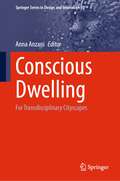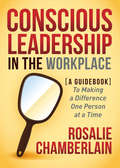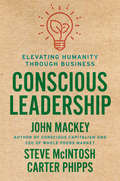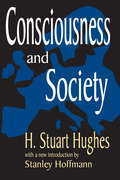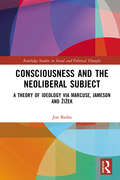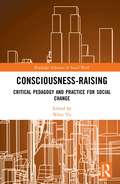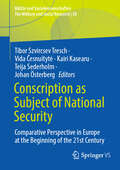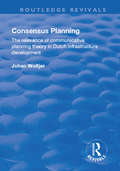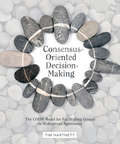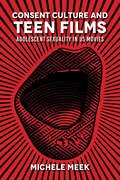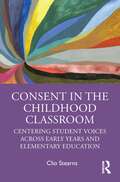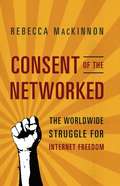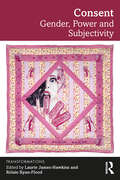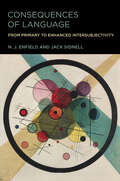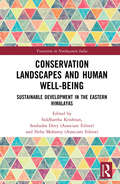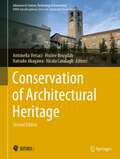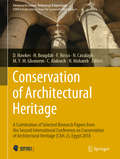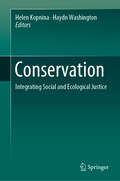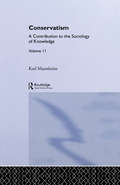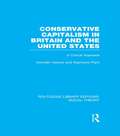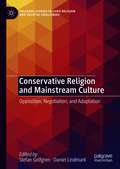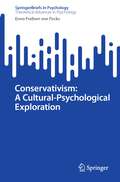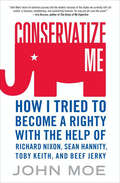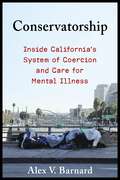- Table View
- List View
Conscious Dwelling: For Transdisciplinary Cityscapes (Springer Series in Design and Innovation #20)
by Anna AnzaniThrough a transdisciplinary perspective, this book examines the complex urban dimension, in front of increasing density, soil consumption, abandoned places, and the recent pandemic which proved megacities particularly inadequate to provide healthy psychophysical conditions. Assuming bodily and emotional comfort as a reference horizon, it tends to inspire the design research overcoming a paradoxical binary logic that separates public and private, outside and inside, culture and nature, mind and places. The first part of the work explores built spaces and addresses sustainable strategies not only to overcome an ecologic and systemic crisis but also to improve places liveability in our contemporary city. The second part deals with our perception of aesthetic spaces, welcoming the stimuli coming from neuro-aesthetics studies on affordances and atmosphere and encouraging the intersection between interior architecture and design culture and arts. The third part examines relational spaces and how they influence human behaviour, starting from psychological, anthropological, and philosophical perspectives. The book benefits scholars and practitioners interested in interior architecture and design, as well as researchers involved in the relationship between people and places. The new challenge posed by the recent pandemic requires more than ever to rely on consciousness, culture and creativity to increase the intelligence of our surroundings, allowing our sense of belonging and improving our personal and mutual well-being.
Conscious Leadership in the Workplace: A Guidebook to Making a Difference One Person at a Time
by Rosalie ChamberlainConscious Leadership in the Workplace is a guidebook for individuals and leaders to lead more effectively and to support and create dynamic, successful, and inclusive environments, by taking a deeper dive into the importance of addressing individual unconscious bias. Unconscious bias can impact the diversity of the workforce and the success of an organization in a global marketplace. Conscious Leadership in the Workplace gives helpful tips for leaders to consider how they currently lead, address their unconscious biases and behaviors, and transform their leadership to effectively lead themselves and others.
Conscious Leadership: Elevating Humanity Through Business
by Carter Phipps John Mackey Steve McintoshFrom Whole Foods CEO John Mackey and his coauthors, a follow-up to groundbreaking bestseller Conscious Capitalism—revealing what it takes to lead a purpose-driven, sustainable business.John Mackey started a movement when he founded Whole Foods, bringing natural, organic food to the masses and not only changing the market, but breaking the mold. Now, for the first time, Conscious Leadership closely explores the vision, virtues, and mindset that have informed Mackey&’s own leadership journey, providing a roadmap for innovative, value-based leadership—in business and in society. Conscious Leadership demystifies strategies that have helped Mackey shepherd Whole Foods through four decades of incredible growth and innovation, including its recent sale to Amazon. Each chapter will challenge you to rethink conventional business wisdom through anecdotes, case studies, profiles of conscious leaders, and innovative techniques for self-development, culminating in an empowering call to action for entrepreneurs and trailblazers—to step up as leaders who see beyond the bottom line.
Consciousness and Society: The Reorientation Of European Social Thought 1890-1930
by H. Stuart Hughes Stanley HoffmanHughes' ideas, and the way they are expressed in Consciousness and Society, have become paradigms of twentieth-century scholarship. In dealing with the changing social thought after 1890 in Europe, Hughes covers a wide array of thinkers and issues in a scholarly, yet graceful manner. His is a study of the "cluster of genius" of Europe at that time: Croce, Durkheim, Freud, Weber, and Nietzsche, as well as other great European minds. The book explores questions that are still relevant in today's society: Is the separation of facts and values tenable, or even desirable? Can rationality accommodate the ideas of a Bergson or a Freud? Is there, or should there be, a relationship between science and religion? And does history have any ultimate meaning for later generations?
Consciousness and the Neoliberal Subject: A Theory of Ideology via Marcuse, Jameson and Žižek (Routledge Studies in Social and Political Thought)
by Jon BailesConsciousness and the Neoliberal Subject outlines a theory of ideological function and a range of ideological positions according to which individuals rationalise and accept socio-economic conditions in advanced consumer capitalist societies. Through a critical examination of the social and psychoanalytic theories of Herbert Marcuse, Fredric Jameson, and Slavoj Žižek, the author extends the understanding of ideology to consider not only the unconscious attachment to social relations, but also the importance of conscious rationalisation in sustaining ideologies. In this way, the book defines different ideologies today in terms of the manner in which they conditionally internalise a dominant neoliberal rationality, and considers the possibility that entrenched social norms may be challenged directly, through conscious engagement. It will appeal to scholars of social and political theory with interests in ideology, neoliberalism, psychoanalytic thought and critical theory.
Consciousness-Raising: Critical Pedagogy and Practice for Social Change (Routledge Advances in Social Work)
by Nilan YuAlmost everywhere across the world, economic inequality has been rising within and across national borders. The vision of a fairer world embodied in the Universal Declaration of Human Rights is being assailed by the advance of conservative ideology aided by vitriolic right-wing populism sweeping across the globe. Neoliberal ideology has had a profound impact in the shaping social work and human services at the frontlines. This book contributes to scholarship in critical practice and theory. It does so by exploring a practice approach steeped in the critical tradition that has hitherto received inordinately nominal attention in social work literature. The book features accounts of consciousness-raising in a variety of contexts – caste relations, race and religion, gender and sexuality, disability and social class. The narratives are meant to tease out conceptions and potential applications of consciousness-raising as an approach for critical practice. It will be of interest to practitioners, educators and students of social work, community development, social development and social pedagogy as well as those engaged in the promotion of human rights and social justice.
Conscription as Subject of National Security: Comparative Perspective in Europe at the Beginning of the 21st Century (Militär und Sozialwissenschaften/The Military and Social Research #58)
by Vida Česnuitytė Tibor Szvircsev Tresch Teija Sederholm Kairi Kasearu Johan ÖsterbergThe volume presents analysis of conscription models in six European countries, four of which continuously kept conscription (Estonia, Finland, Norway, and Switzerland), and two re-established conscriptions in recent years (Lithuania and Sweden). The first part of the book provides a description of country-specific aspects related to conscription. The second part is dedicated for an in-depth analysis of the following topics: attitudes towards defence forces; adaptation to conditions during conscription; motivation to do initial military service; unit cohesion during conscription; leadership in the context of conscription; intentions to move from conscription to military professionals. Empirical data was collected in 2021-2022 by 8783 recruits. The book is an outstanding source of knowledge and a practical tool for conscription models suitable for the certain country. The volume is of interest to defence practitioners and policy makers, researchers, teachers and students who focus on military sociology and defence politics.
Conscription, Family, and the Modern State
by Dorit GevaThe development of modern military conscription systems is usually seen as a response to countries' security needs, and as reflection of national political ideologies like civic republicanism or democratic egalitarianism. This study of conscription politics in France and the United States in the first half of the twentieth century challenges such common sense interpretations. Instead, it shows how despite institutional and ideological differences, both countries implemented conscription systems shaped by political and military leaders' concerns about how taking ordinary family men for military service would affect men's presumed positions as heads of families, especially as breadwinners and figures of paternal authority. The first of its kind, this carefully researched book combines an ambitious range of scholarly traditions and offers an original comparison of how protection of men's household authority affected one of the paradigmatic institutions of modern states.
Consensus Planning: The Relevance of Communicative Planning Theory in Duth Infrastructure Development
by Johan WoltjerThis title was published in 2000: This text offers a standpoint on communicative, participatory planning called "consensus planning". The discussion takes place in the Netherlands, where consensus-based decision-making is part of the national heritage. The book explores recent Dutch infrastructure development experiences and concludes that communicative planning theory does not offer uniform relevance for the challenges that planning practitioners face. Building on these experiences, it proposes the concept of consensus planning as valuable in a complementary, normalized, and contingent way. Consensus planning, in other words, has diverse practical appearances and sometimes may not exist or be desirable.
Consensus-Oriented Decision-Making
by Tim HartnettConsensus-Oriented Decision-Making combines extensive knowledge of effective communication techniques with deep insight into conflict resolution and group dynamics. This practical step-by-step facilitation guide presents an efficient method any business, government, non-profit, social or community group can use to generate widespread agreement on important decisions with full member participation in an atmosphere of true collaboration.
Consent Culture and Teen Films: Adolescent Sexuality in US Movies
by Michele MeekTeen films of the 1980s were notorious for treating consent as irrelevant, with scenes of boys spying in girls' locker rooms and tricking girls into sex. While contemporary movies now routinely prioritize consent, ensure date rape is no longer a joke, and celebrate girls' desires, sexual consent remains a problematic and often elusive ideal in teen films.In Consent Culture and Teen Films, Michele Meek traces the history of adolescent sexuality in US cinema and examines how several films from the 2000s, including Blockers, To All the Boys I've Loved Before, The Kissing Booth, and Alex Strangelove, take consent into account. Yet, at the same time, Meek reveals that teen films expose how affirmative consent ("yes means yes") fails to protect youth from unwanted and unpleasant sexual encounters. By highlighting ambiguous sexual interactions in teen films—such as girls' failure to obtain consent from boys, queer teens subjected to conversion therapy camps, and youth manipulated into sexual relationships with adults—Meek unravels some of consent's intricacies rather than relying on oversimplification.By exposing affirmative consent in teen films as gendered, heteronormative, and cis-centered, Consent Culture and Teen Films suggests we must continue building a more inclusive consent framework that normalizes youth sexual desire and agency with all its complexities and ambivalences.
Consent in the Childhood Classroom: Centering Student Voices Across Early Years and Elementary Education
by Clio StearnsConsent in the Childhood Classroom challenges typical premises of social and emotional learning, self-regulation, and putative misbehavior by centering the theme of consent in the experiences of young children and their teachers. Early childhood and elementary teachers often face disruptions and acts of dissent from young students, without a helpful conceptual framework for understanding how these expressions may stem from social injustices, developmental nuances, and problematic assumptions about the nature of children’s agency. By posing complex yet relatable questions about the presumptions of authority, positivity, and routines in learning environments, and drawing on classroom anecdotes along with interviews with children and teachers, this book offers an accessible approach to cultivating expansive relationships in the classroom, a vision for a richer and more mutual education, and a clearer understanding of what school means from the perspective of the child.
Consent of the Networked: The Worldwide Struggle For Internet Freedom
by Rebecca Mackinnon<P>The Internet was going to liberate us, but in truth it has not. For every story about the web's empowering role in events such as the Arab Spring, there are many more about the quiet corrosion of civil liberties by companies and governments using the same digital technologies we have come to depend upon. <P> Sudden changes in Facebook's features and privacy settings have exposed identities of protestors to police in Egypt and Iran. Apple removes politically controversial apps at the behest of governments as well as for its own commercial reasons. Dozens of Western companies sell surveillance technology to dictatorships around the world. <P>Google struggles with censorship demands from governments in a range of countries--many of them democracies--as well as mounting public concern over the vast quantities of information it collects about its users. <P> In Consent of the Networked, journalist and Internet policy specialist Rebecca MacKinnon argues that it is time to fight for our rights before they are sold, legislated, programmed, and engineered away. Every day, the corporate sovereigns of cyberspace make decisions that affect our physical freedom--but without our consent. <P>Yet the traditional solution to unaccountable corporate behavior--government regulation--cannot stop the abuse of digital power on its own, and sometimes even contributes to it. <P> A clarion call to action, Consent of the Networked shows that it is time to stop arguing over whether the Internet empowers people, and address the urgent question of how technology should be governed to support the rights and liberties of users around the world.
Consent: Gender, Power and Subjectivity (Transformations)
by Róisín Ryan-Flood Laurie James-HawkinsThis book considers the concept of consent in different contexts with the aim of exploring the nuances of what consent means to different people and in different situations. While it is generally agreed that consent is a fluid concept, legal and social attempts to explain its meaning often centre on overly simplistic, narrow and binary definitions, viewing consent as something that occurs at a specific point in time. This book examines the nuances of consent and how it is enacted and re-enacted in different settings (including online spaces) and across time. Consent is most often connected to the idea of sexual assault and is often viewed as a straight-forward concept and one that can be easily explained. Yet there is confusion among the public, as well as among academics and professionals as to what consent truly is and even the degree to which individuals conceptualise and act on their own ideas about consent within their own lives. Topics covered include: consent in digital and online interactions, consent in education, consent in legal settings and the legal boundaries of consent, and consent in sexual situations including sex under the influence of substances, BDSM, and kinky sex. This book will appeal to students and scholars interested in issues of consent from the social sciences, gender theory, feminist studies, law, psychology, public health, and sexuality studies.
Consequences of Language: From Primary to Enhanced Intersubjectivity
by Jack Sidnell N. J. EnfieldWhat is it about humans that makes language possible, and what is it about language that makes us human?If you are reading this, you have done something that only our species has evolved to do. You have acquired a natural language. This book asks, How has this changed us? Where scholars have long wondered what it is about humans that makes language possible, N. J. Enfield and Jack Sidnell ask instead, What is it about humans that is made possible by language? In Consequences of Language their objective is to understand what modern language really is and to identify its logical and conceptual consequences for social life. Central to this undertaking is the concept of intersubjectivity, the open sharing of subjective experience. There is, Enfield and Sidnell contend, a uniquely human form of intersubjectivity, and it is essentially intertwined with language in two ways: a primary form of intersubjectivity was necessary for language to have begun evolving in our species in the first place and then language, through its defining reflexive properties, transformed the nature of our intersubjectivity. In the authors&’ analysis, social accountability—the bedrock of society—is grounded in this linguistically transformed, enhanced kind of intersubjectivity.The account of the language-mind-society connection put forward in Consequences of Language is one of unprecedented reach, suggesting new connections across disciplines centrally concerned with language—from anthropology and philosophy to sociology and cognitive science—and among those who would understand the foundational role of language in making us human.
Conservation Landscapes and Human Well-Being: Sustainable Development in the Eastern Himalayas (Transition in Northeastern India)
by Siddhartha KrishnanThe Himalayas are said to be the youngest mountain ranges in the world. This book studies the well-being of the eastern Himalayan forest-dwellers in terms of their capabilities and functioning. Using Amartya Sen’s and Martha Nussbaum’s Capabilities Approach, it examines the educational and health opportunities and substantial freedoms afforded to farmers and pastoralists living and working in the Senchal and Singalila Protected Areas of North Bengal, India. It also discusses the challenges and potential of the Forest Rights Act as a well-being delivery mechanism. The book adopts a comparative narrative of socio-ecological information generated from interviews, ecological field methods, remote sensing and participatory rural appraisals to provide insight on human development in conservation contexts. This volume will be of interest to students and researchers of conservation biology, development studies, socio-ecological systems studies, political ecology, human development index, ecological economics, environmental sociology, and South Asian studies. It will also be useful to policy-makers and NGOs in the conservation and livelihoods sector.
Conservation of Architectural Heritage (Advances in Science, Technology & Innovation)
by Hocine Bougdah Natsuko Akagawa Antonella Versaci Nicola CavalagliThis book focuses on the management and conservation of architectural heritage with the aim of increasing awareness about the value of such conservation and of saving what is left of history, which in turn rewards societies by supporting the tourism industry, generating economic return, and preserving communities’ identities.Since it has become an essential need to manage and conserve the architectural heritage in order to protect the identity and heritage of a city, there appeared a gap between the theory and its application. Therefore, a considerable amount of attention has been directed by experts in this field toward emphasizing the contribution of heritage conservation in order to inspire the development of imaginative, useful high-quality design.
Conservation of Architectural Heritage: A Culmination of Selected Research Papers from the Second International Conference on Conservation of Architectural Heritage (CAH-2), Egypt 2018 (Advances in Science, Technology & Innovation)
by Hocine Bougdah Nabil Mohareb Dean Hawkes Chaham Alalouch Federica Rosso Nicola Cavalagli Mahmoud Yousef M. GhoneemHistory is one of the main aspects that shapes a country’s culture and leaves its traces on the built environment in the form of an architectural heritage. Such a heritage records the existence of humans, their past endeavours and in doing so preserves their cultures and traditions for future generations and contributes to the formation of their identities by acting as an inspiration for their architectural achievements. From this perspective, conservation of architectural heritage becomes important to both current and future architectural endeavours. This book discusses several topics of great importance and relevance to the conservation of worldwide architectural heritage. From historic cities and cultural landscapes to some of the largest archaeological sites in the world, conserving such a legacy is a challenging task that requires commitment, effort and international cooperation that this book proves possible. The book has an abundance of information that undoubtedly covers major areas in the field of architecture heritage. It discusses the challenges faced in the field and demonstrates the importance of such an undertaking to individuals, communities, and cities’ identity all over the world. It also highlights the role of individuals and organizations in the precise and complex process of conserving architectural heritage.
Conservation: Integrating Social and Ecological Justice (Routledge Explorations In Environmental Studies)
by Helen Kopnina Haydn WashingtonThis book provides keys to decrypt current political debates on the environment in light of the theories that support them, and provides tools to better understand and manage environmental conflicts and promote environmentally friendly behaviour. As we work towards global sustainability at a time when efforts to conserve biodiversity and combat climate change correspond with land grabs by large corporations, food insecurity, and human displacement. While we seek to reconcile more-than-human relations and responsibilities in the Anthropocene, we also struggle to accommodate social justice and the increasingly global desire for economic development. These and other challenges fundamentally alter the way social scientists relate to communities and the environment. This book takes as its point of departure today’s pressing environmental challenges, particularly the loss of biodiversity, and the role of communities in protected areas conservation. In its chapters, the authors discuss areas of tension between local livelihoods and international conservation efforts, between local communities and wildlife, and finally between traditional ways of living and ‘modernity’. The central premise of this book is while these tensions cannot be easily resolved they can be better understood by considering both social and ecological effects, in equal measure. While environmental problems cannot be seen as purely ecological because they always involve people, who bring to the environmental table their different assumptions about nature and culture, so are social problems connected to environmental constraints. While nonhumans cannot verbally bring anything to this negotiating table, aside from vast material benefits that society relies on, the distinct perspective of this book is that there is a need to consider the role of nonhumans as equally important stakeholders – albeit without a voice. This book develops an argument that human-environmental relationships are set within ecological reality and ecological ethics and rather than being mutually constitutive processes, humans have obligate dependence on nature, not vice versa. This would enable an ethical position encompassing the needs of other species and giving simultaneous (without one being subordinated to another) consideration to justice for humans and non-humans alike. The book is accessible to both social scientists and conservation specialists, and intends to contribute to strengthening interdisciplinary collaborations in the field of conservation.
Conservatism: A Contribution To The Sociology Of Knowledge (International Library Of Society Ser.)
by Karl MannheimFirst published in 1986. Routledge is an imprint of Taylor & Francis, an informa company.
Conservative Capitalism in Britain and the United States: A Critical Appraisal (Routledge Library Editions: Social Theory)
by Raymond Plant Kenneth HooverThe shock waves of conservative advances have reached into every corner of American and British politics. Parties of the right have prospered, while parties of the left have stumbled, retreated, and are now regrouping. The agenda for both right and left is set by the terms of the free-market doctrines that have displaced the post-war consensus politics of liberal capitalism. This volume describes and challenges the ideological basis of the free-market right. Though critiques of the policies of the Reagan and Thatcher governments are hardly in short supply, this major new study offers the most thorough and up-to-date analysis available. No other book considers in such depth conservative ideas and policies on both sides of the Atlantic. It provides the first clear account of the distinction between conservative and other forms of capitalism. It also examines the fault lines dividing opposing camps within conservative capitalism and their consequences for domestic policy in Britain and the US. Linking political theory and public policy, it is one of the few critical appraisals of the New Right based on a clear understanding of what the arguments for the free market really are. Finally, the authors demonstrate what the left needs to learn from its failures, how to remould its understanding of the relationship between politics and the market, and how to recapture the lost initiative.
Conservative Religion and Mainstream Culture: Opposition, Negotiation, and Adaptation (Palgrave Studies in Lived Religion and Societal Challenges)
by Stefan Gelfgren Daniel LindmarkThis book highlights tensions and negotiating processes between modern society and conservative religious groups. Conservative religion and society have co-existed for at least a century in an increasingly pluralist society. Still, the right to religious freedom and tolerance clashes with certain expressions of religious exclusivity. In this book, scholars from different disciplines look at the various ways in which representatives of conservative religious faith live, practice, and formulate their religion in relation to a contemporary mainstream culture. The studies included represent various settings with regard to time, religion and geography, and are presented in three thematic groups: culture, schooling and public life, and media. Taken together, the studies contribute to a more nuanced and diverse picture of conservative religious believers and their engagement with mainstream society. The book will be of interest to students and researchers in the fields of sociology of religion, church history and contemporary religion.
Conservativism: A Cultural-Psychological Exploration (SpringerBriefs in Psychology)
by Enno Freiherr von FircksThe present work discusses the phenomenon of conservativism from a qualitative, cultural-psychological perspective. As such, the text breaks with current mainstream research about political ideologies wanting to assess a political culture within the simple administration of a questionnaire. The SpringerBrief will oppose such a perspective trying to assess how the conservative-minded person will structure space and time in peculiar ways. In the first part of the study, participants were invited to reflect about how they preserve or conserve meaning in various activities whereas the second part of the study tried to shed light onto how something preservable or conservable comes into being and what it actually makes it preservable. Here, an autoethnographic study revealed that something becomes meaningfully preservable when it satisfies multiple demands of the Self as well as of the environment. Readers will realize the insufficiency of the positivistic attitude analyzing conservativism from a simple quantitative perspective, and researchers are shown how political ideologies or cultures can be assessed ecologically – something that has not yet been undertaken. This leads to an appeal for scientists to study the phenomenon of conservativism more wholistically.
Conservatize Me: How I Tried to Become a Righty with the Help of Richard Nixon, Sean Hannity, Toby Keith, and Beef Jerky
by John MoeIt has been said that everyone in America is firmly planted in red or blue—permanently conservative or irreversibly liberal. But are we all really that locked in to the left or the right? A lifelong liberal, John Moe was determined to find out. So he reset his radio dials from NPR to Rush Limbaugh, joined some of today's most influential conservative thinkers for a series of "conversion sessions," made pilgrimages to the Ronald Reagan and Richard M. Nixon museums, and spent the Fourth of July in the most Bush-friendly county in the country, in an attempt to discover if there was actually a conservative trapped inside him yearning to be set free.Conservatize Me is a fresh, humorous, and highly entertaining look at our country's political landscape, one that will strike a powerful chord with millions of disgruntled Americans while stimulating the mind and tickling the funny bone.
Conservatorship: Inside California’s System of Coercion and Care for Mental Illness
by Alex V. BarnardIs involuntary psychiatric treatment the solution to the intertwined crises of untreated mental illness, homelessness, and addiction? In recent years, politicians and advocates have sought to expand the use of conservatorships, a legal tool used to force someone deemed “gravely disabled,” or unable to meet their needs for food, clothing, or shelter as a result of mental illness, to take medication and be placed in a locked facility. At the same time, civil liberties and disability rights groups have seized on cases like that of Britney Spears to argue that conservatorships are inherently abusive.Conservatorship is an incisive and compelling portrait of the functioning—and failings—of California’s conservatorship system. Drawing on hundreds of interviews with professionals, policy makers, families, and conservatees, Alex V. Barnard takes readers to the streets where police encounter homeless people in crisis, the locked wards where people receiving treatment are confined, and the courtrooms where judges decide on conservatorship petitions. As he shows, California’s state government has abdicated authority over this system, leaving the question of who receives compassionate care and who faces coercion dependent on the financial incentives of for-profit facilities, the constraints of underresourced clinicians, and the desperate struggles of families to obtain treatment for their loved ones.This book offers a timely warning: reforms to expand conservatorship will lead to more coercion but little transformative care until government assumes accountability for ensuring the health and dignity of its most vulnerable citizens.
